Read football & basketball articles and other sports only at Finessekick.com

The 2034 World Cup Announcement: Saudi Arabia Amidst Controversy
The announcement that Saudi Arabia will host the 2034 FIFA World Cup has sparked significant controversy and criticism from various quarters. While the decision marks a historic moment for the Middle Eastern nation, it has also raised concerns about human rights, environmental impact, and the integrity of the selection process. This article delves into the reasons behind the criticism, the reactions from different stakeholders, and the potential implications for the future of football.
FOOTBALL
A. Sahrul Romadhon
12/14/20243 min read


Background
On December 11, 2024, FIFA President Gianni Infantino confirmed that Saudi Arabia would host the 2034 World Cup. This decision followed a virtual extraordinary Congress where the bid was approved without any competing bids. The announcement came alongside the confirmation that the 2030 World Cup would be hosted by Spain, Portugal, and Morocco, with one-off matches in Argentina, Paraguay, and Uruguay1.
Reasons for Criticism
Human Rights Concerns
One of the primary reasons for the backlash is Saudi Arabia's human rights record. Critics, including Amnesty International and Human Rights Watch, have highlighted issues such as the treatment of migrant workers, restrictions on freedom of speech, and the rights of women and the LGBTQ+ community2. These organizations argue that hosting the World Cup in Saudi Arabia could lead to further human rights abuses, similar to those reported during the 2022 World Cup in Qatar.
Environmental Impact
The environmental impact of hosting the World Cup in Saudi Arabia has also been a point of contention. The country's desert climate will likely necessitate holding the tournament in the Northern Hemisphere winter, as was done in Qatar. Additionally, the construction of new stadiums and infrastructure will contribute to increased carbon emissions, raising concerns among climate activists2.
Accusations of Sportswashing
The term "sportswashing" refers to the use of sports events to improve a country's international image while diverting attention from its domestic issues. Critics argue that Saudi Arabia's investment in hosting the World Cup is an attempt to sportswash its human rights record and present a more favorable image to the world4. This has led to accusations that FIFA is prioritizing financial gains over ethical considerations.
Reactions from the Football Community
The decision to award the 2034 World Cup to Saudi Arabia has elicited mixed reactions from the football community. Some stakeholders, including players and fans, have expressed excitement about the tournament being held in a new region. However, many others have voiced their concerns about the implications of the decision.
Supporters' Perspective
Supporters of the decision argue that hosting the World Cup in Saudi Arabia will help promote football in the Middle East and provide an opportunity for cultural exchange. They believe that the tournament can serve as a catalyst for positive change in the region.
Critics' Perspective
Critics, on the other hand, emphasize the need for FIFA to uphold its commitment to human rights and environmental sustainability. They argue that the decision undermines the credibility of the organization and sets a dangerous precedent for future World Cups5.
Conclusion
The announcement of Saudi Arabia as the host of the 2034 World Cup has generated significant controversy and criticism. Concerns about human rights, environmental impact, and accusations of sportswashing have overshadowed the excitement surrounding the tournament. As the world prepares for the 2034 World Cup, it is crucial for FIFA to address these issues and ensure that the event is conducted in a manner that respects human rights and promotes sustainability.
FAQs
Q: Why is the 2034 World Cup in Saudi Arabia controversial? A: The controversy stems from Saudi Arabia's human rights record, environmental concerns, and accusations of sportswashing.
Q: What are the human rights concerns related to the 2034 World Cup? A: Critics highlight issues such as the treatment of migrant workers, restrictions on freedom of speech, and the rights of women and the LGBTQ+ community.
Q: How will the environmental impact be managed? A: The desert climate will likely necessitate holding the tournament in winter, and the construction of new infrastructure will contribute to increased carbon emissions.
Q: What is sportswashing? A: Sportswashing refers to the use of sports events to improve a country's international image while diverting attention from its domestic issues.
Q: What are the potential benefits of hosting the World Cup in Saudi Arabia? A: Supporters argue that it will promote football in the Middle East and provide an opportunity for cultural exchange.
FinesseKick.com
Discover the latest articles about the world of sports.
Know More
Contact
© 2024. All rights reserved.
